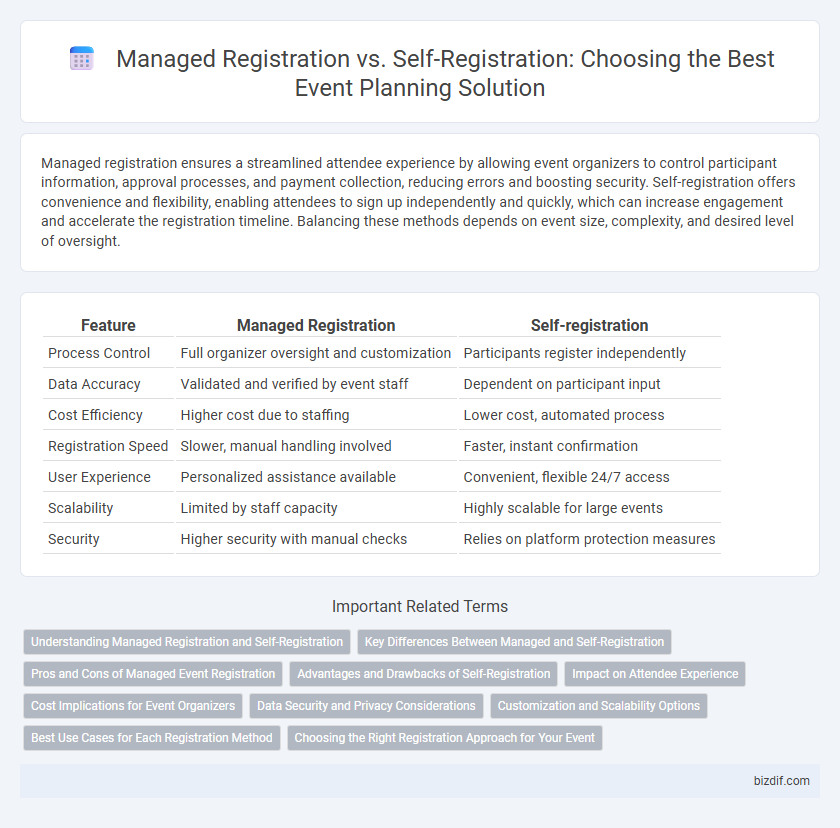Managed registration ensures a streamlined attendee experience by allowing event organizers to control participant information, approval processes, and payment collection, reducing errors and boosting security. Self-registration offers convenience and flexibility, enabling attendees to sign up independently and quickly, which can increase engagement and accelerate the registration timeline. Balancing these methods depends on event size, complexity, and desired level of oversight.
Table of Comparison
| Feature | Managed Registration | Self-registration |
|---|---|---|
| Process Control | Full organizer oversight and customization | Participants register independently |
| Data Accuracy | Validated and verified by event staff | Dependent on participant input |
| Cost Efficiency | Higher cost due to staffing | Lower cost, automated process |
| Registration Speed | Slower, manual handling involved | Faster, instant confirmation |
| User Experience | Personalized assistance available | Convenient, flexible 24/7 access |
| Scalability | Limited by staff capacity | Highly scalable for large events |
| Security | Higher security with manual checks | Relies on platform protection measures |
Understanding Managed Registration and Self-Registration
Managed registration involves event organizers controlling participant sign-ups, allowing for customized approval processes, waitlists, and attendee data management to ensure a smooth event experience. Self-registration enables attendees to independently sign up through online platforms, offering convenience and immediate confirmation but requiring less oversight from organizers. Understanding these registration types helps in selecting the appropriate approach based on event complexity, security needs, and participant volume.
Key Differences Between Managed and Self-Registration
Managed registration involves event organizers controlling attendee data, approvals, and payment processing, ensuring a streamlined and secure experience. Self-registration allows participants to independently sign up, often using automated systems that reduce administrative workload but may require more monitoring for accuracy. Key differences include the level of organizer oversight, customization options, and potential impact on event data integrity and attendee experience.
Pros and Cons of Managed Event Registration
Managed event registration offers enhanced control over attendee data and ensures a smoother verification process, reducing errors and no-shows. This method can provide personalized assistance, improve security, and facilitate seamless payment processing, though it often requires more administrative resources and can increase costs. However, managed registration may limit participant flexibility and extend registration time compared to self-registration options.
Advantages and Drawbacks of Self-Registration
Self-registration offers event planners increased convenience and cost efficiency by allowing attendees to sign up independently, reducing administrative workload. However, drawbacks include potential data inaccuracies and limited control over participant verification, which can affect event security and attendee quality. Despite these challenges, self-registration enhances user experience with instant access but may require robust system features to mitigate risks.
Impact on Attendee Experience
Managed registration creates a seamless attendee experience by providing personalized support, streamlined check-in, and reduced wait times. Self-registration offers flexibility and autonomy, allowing attendees to register at their convenience but may lead to inconsistent data collection and longer on-site queues. Balancing both approaches can optimize satisfaction and operational efficiency, tailoring the event flow to attendee preferences and event scale.
Cost Implications for Event Organizers
Managed registration typically incurs higher upfront costs due to the need for comprehensive software licenses, dedicated staff, and customized support services. Self-registration significantly reduces expenses by allowing attendees to handle their sign-up process, minimizing labor and administrative overhead for event organizers. Cost savings from self-registration can be redirected toward marketing and event enhancements, improving overall budget efficiency.
Data Security and Privacy Considerations
Managed registration ensures enhanced data security by allowing event organizers to control access, verify attendee information, and monitor data handling processes directly. Self-registration can increase the risk of data breaches due to less oversight, as attendees input their own information and systems may lack robust encryption or authentication protocols. Prioritizing compliance with GDPR and PCI DSS standards in managed registration systems significantly reduces vulnerabilities and protects sensitive personal and payment data.
Customization and Scalability Options
Managed registration offers extensive customization options, allowing event planners to tailor workflows, branding, and data collection to specific needs, ensuring a personalized attendee experience. Self-registration provides scalability by enabling a larger number of participants to register independently through automated platforms, reducing administrative workload and accommodating sudden increases in event size. Both methods support integration with CRM systems and marketing tools, but managed registration typically delivers more control over complex event scenarios and compliance requirements.
Best Use Cases for Each Registration Method
Managed registration is ideal for exclusive events where organizers need full control over attendee lists, ensuring security and tailored communication. Self-registration suits large-scale or public events, allowing participants to sign up easily and quickly with minimal administrative oversight. Events requiring detailed vetting, like conferences or VIP gatherings, benefit from managed registration, while open-access festivals or workshops thrive with self-registration options.
Choosing the Right Registration Approach for Your Event
Managed registration offers personalized attendee support and reduces errors by allowing event organizers to control the entire sign-up process. Self-registration provides convenience and scalability, enabling participants to register independently through automated online systems. Selecting the right approach depends on event size, complexity, and the desired level of control over attendee data and experience.
Managed registration vs Self-registration Infographic

 bizdif.com
bizdif.com